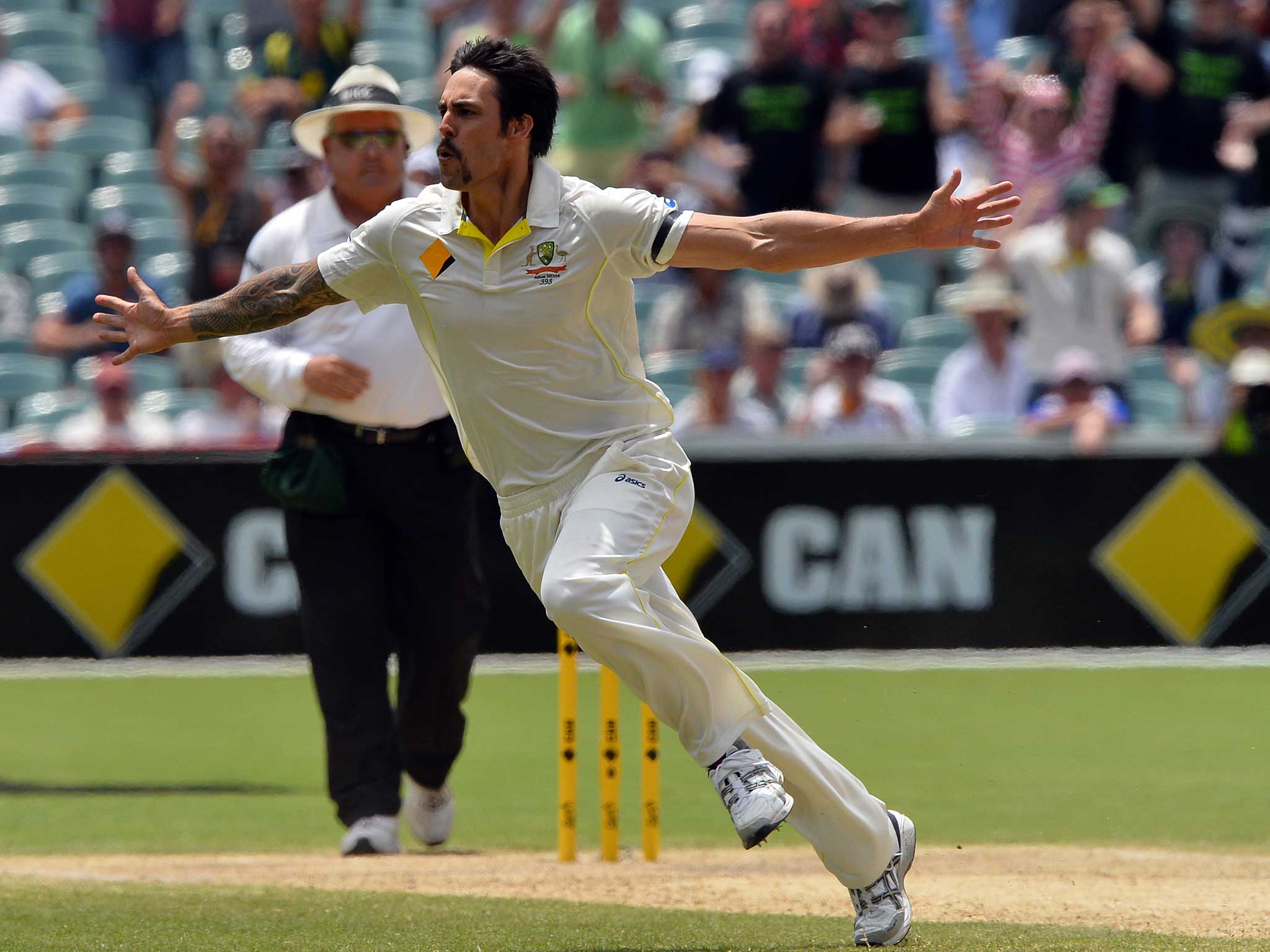Ashes 2013-14: Mitchell Johnson is proving England are spent force
Another spineless batting collapse and the prospect of more pain at Perth means the Ashes have almost slipped from Cook's grasp already, writes Stephen Brenkley in Adelaide

Only once in the history of the Ashes have a team come from two Tests behind to win the series. It is not about to happen again. England will pitch up in Perth for the Third Test later this week clinging on to hope and that solitary precedent, but otherwise bereft.
They do not have Don Bradman in their ranks, the greatest player of all, who turned round the contest in 1936-37. In two weeks, they have been outplayed and outclassed.
The 3-0 series win that England engineered in the summer to secure the Ashes for the third time in succession is a fond, bitter memory. It has failed to sustain them here, and those who thought they still had enough fuel in the tank have been proved hopelessly optimistic. England are running on empty.
AUDIO: Stephen Brenkley and Tom Collomosse discuss the days play. Listen below…
They have looked like a team who, frankly, are finished as a force. They will say they won in India last winter and beat Australia in the summer; doubtless they will keep saying it. But they appear to have forgotten how to assemble a proper Test innings. They have passed 400 only once in the past 13 attempts; on a perfect batting strip here they were swept aside for 172.
There are few able replacements, none proven and, bizarrely, most of the batsmen may have to survive. Matt Prior and Graeme Swann may fear the knock on the door from the selector, but dropping them would be no kind of answer. Doing nothing, however, in the wake of what is likely to be two heavy defeats is not an option in big-time cricket if credibility is to be preserved.
The main but not only difference between summer and winter is Mitchell Johnson, who was not selected for the tour to England. His career might have been finished. The selectors seemed to have tired of his mercurial displays.
His one-day form in England and then in India persuaded them that his time should come again. How right they were. Almost from the start in Brisbane he has been rapid, hostile and unerring. Used in short bursts he has terrified England.
England’s first innings was already in a shambolic state when Johnson re-entered the arena after lunch on the third day. This was largely of the tourists’ own making.
Two unimaginably crass strokes, played by Joe Root and Kevin Pieter-sen, were evidence of how being under the pump in top-level anything can addle the brain. At 111 for 4, when Michael Carberry’s solid innings was ended by a superb catch, England were going nowhere. Soon enough they were going nowhere fast.
Johnson took 5 for 12 in 18 balls. In his first over after lunch he had the debutant Ben Stokes lbw, pinned to the crease with a ball that seared back. It needed a review to confirm the decision. Perhaps the umpire did not pick it up either, for it was a ball that was going in only one direction. It was the first Stokes had received from Johnson; he will now be waiting anxiously for the second.
Four balls later, Prior, having evaded a couple of bouncers, flirted triflingly at a ball of fuller length outside off and was caught behind. The trudge off, to which Prior is becoming accustomed, was embarrassingly curtailed while it was checked if Johnson had bowled a no-ball.
There was a long wait for the next ball while Stuart Broad had the sightscreen amended. Whatever had been done was not an outrageous success from Broad’s point of view. He moved across his crease and had his leg stump removed by a humdinger.
Eight runs came from Johnson’s next 10 balls, including a deliberate uppercut by Ian Bell, who batted resplendently – a rose among thorns. Then Mitchell had Swann caught at slip, driving hard, and bowled Jimmy Anderson middle stump.
Resistance, brave resistance, followed from Monty Panesar of all people. Johnson went out to the long grass. Bell played a few more rasping strokes. He had dealt wonderfully with Johnson, twice uppercutting him, never looking ruffled.
After a few overs of this effrontery, Michael Clarke, Australia’s captain, summoned his destroyer-in-chief again. It took him two balls to knock down Panesar’s castle. Australia batted again and lost two quick wickets, but it mattered not.
There have been spectacular exhibitions from Johnson in the past but he has tended to blow hot and cold. Against the Poms he has blown mostly cold, unhinged by their vocal support, except on one famous occasion in Perth three years ago.
With a rapid pitch, with which he is extremely familiar, to come in Perth next week, England must be quaking in their boots.
Join our commenting forum
Join thought-provoking conversations, follow other Independent readers and see their replies
Comments
Bookmark popover
Removed from bookmarks